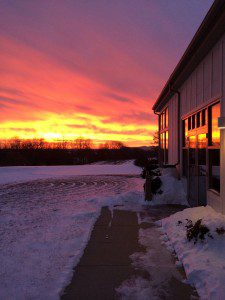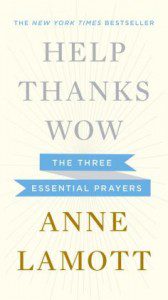This post is the third and final part in a series of three posts inspired by Anne Lamott’s book Help, Thanks, Wow
Ann Lamott’s initial claim was that, “Here are the two best prayers I know: ‘Help me, help me, help me,’ and ‘Thank you, thank you, thank you.’” But more than a decade later, she wisely added a third essential prayer: “Wow.” And cultivating a prayerful sense of awe at the stunning beauty of the universe is another spiritual practice about which many religious progressives can agree. Indeed, one of the most frequent formulations in the religious education curricula of my own Unitarian Universalist tradition is some variation of “I wonder….” We encourage our children, youth (and our adults too!) to cultivate a foundational sense of wonder and awe toward this world in which we find ourselves.
Along these lines, Rabbi Abraham Joshua Heschel often talked about the importance of “Radical Amazement.” And although there is much truth in that bumper sticker that says, “If you’re not outraged, you’re not paying attention,” it is equally true that “If you are not radically amazed, you are not paying attention.”
Wow, radical amazement is watching the Olympics and seeing the heights of human athletic potential.
Wow, radical amazement is wandering through an art museum and seeing the stunning creativity of human beings.
Wow, radical amazement is the radiant autumnal beauty of leaves in the fall, the peaceful hush of a snow-covered landscape, the lush verdant greenness of spring, the expanse of the ocean, and the endless depth of the night sky in our universe with its more than 400 billion galaxies. Wow.
What has stopped you in your tracks recently and made you say, “Wow!”?

In the past few years, another of my most common spiritual practices has been taking photographs with my iPhone using the Instagram app of those moments in life when I come across sights that leave me transfixed in radical amazement. I’ve found that rather than distracting me, photography when done slowly and with intention brings me even more deeply into the present moment, often causing me to notice details, angles, and beauty I likely otherwise would have missed.
And similar to the practice of savoring moments of gratitude, I invite you to savor moments of radical amazement whenever they arise in your life. Give yourself permission to linger in those moments of awe, wow, and wonder.
Along these lines, there is a part of Gail Godwin’s novel Evensong that has stuck with me years later. She writes that one of her favorite phrases from the Episcopal Book of Common Prayer is a three-word part of a prayer that asks, “Shield the joyous.” And there’s something lovely to this notion of “shielding the joyous,” including the joy that arises in ourselves. There is much tragedy and sadness in this life, and giving ourselves permission to experience and process emotions around loss is incredibly important, but so too is giving ourselves permission to fully experience joy, wonder, and awe.
Anne Lamott ends her book with an epilogue titled, “Amen” — a concluding prayerful affirmation that simply means, “So Be It” or “May it be so.” And in this section, she quotes a beautiful poem by Raymond Carver that helps bring together the core hope at the center of those three essential prayers, “Help, Thanks, Wow.” Carver writes,
And did you get what
you wanted from this life, even so?
I did.
And what did you want?
To call myself beloved, to feel myself
beloved on the earth.
Many religious progressive often invoke Martin Luther King, Jr.’s dream of building a Beloved Community on this earth. And Carver’s poem touches on the path that we must follow for ourselves and with others if we are to turn that dream of Beloved Community into deeds, into reality. We must call ourselves beloved, we must feel ourselves beloved, and we must come to experience and treat all people, all beings, as beloved on this earth.
Help, Thanks, Wow. Connection, Gratitude, and Awe. Three essential prayers. Or, if you prefer, three essential dispositions or practices. Help, Thanks, Wow. May it be so. And Blessed Be.
The Rev. Dr. Carl Gregg is a trained spiritual director, a D.Min. graduate of San Francisco Theological Seminary, and the minister of the Unitarian Universalist Congregation of Frederick, Maryland. Follow him on Facebook (facebook.com/carlgregg) and Twitter (@carlgregg).
Learn more about Unitarian Universalism:
http://www.uua.org/beliefs/principles













